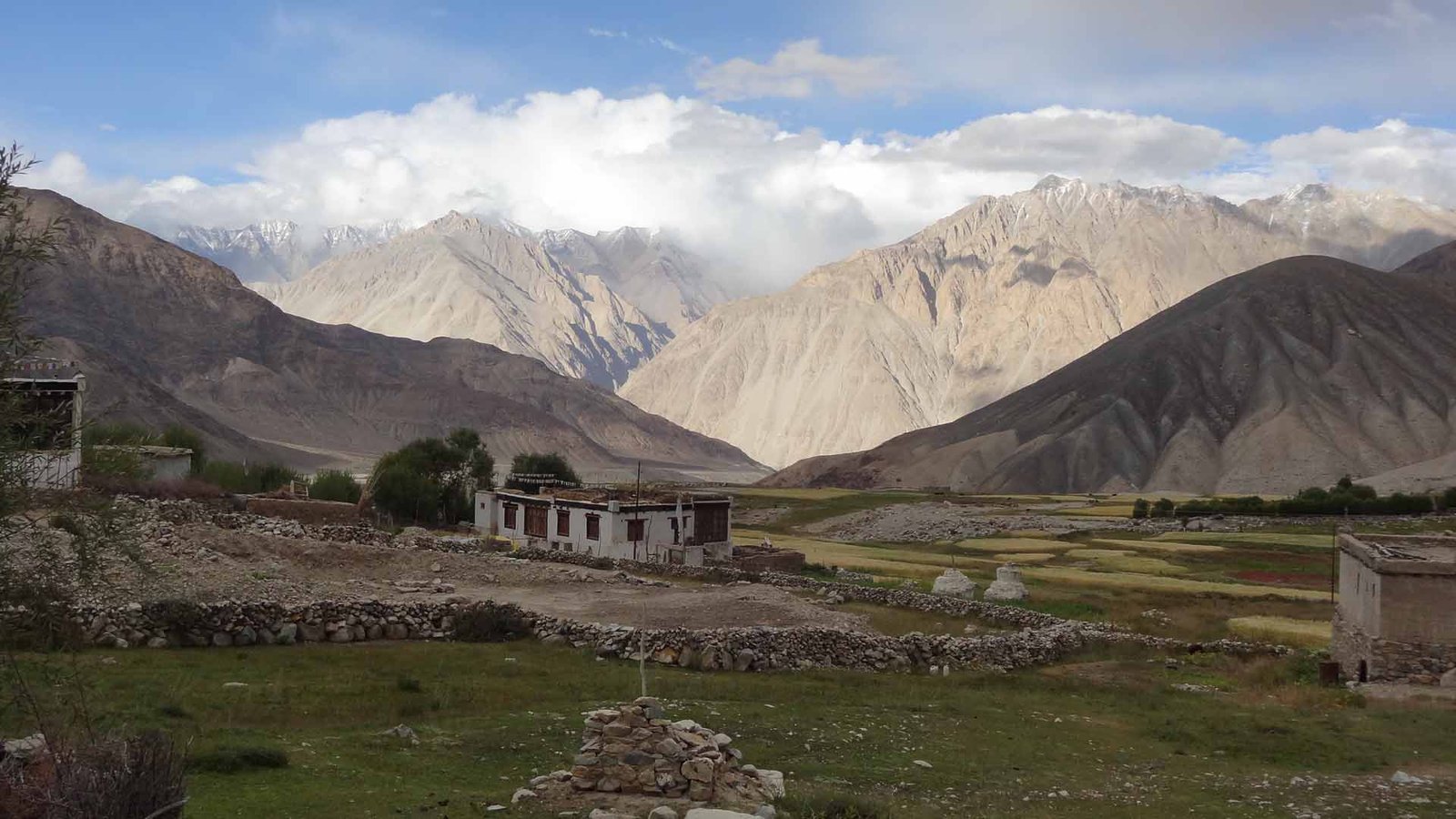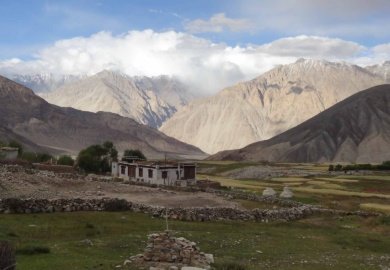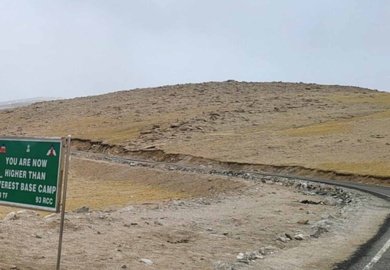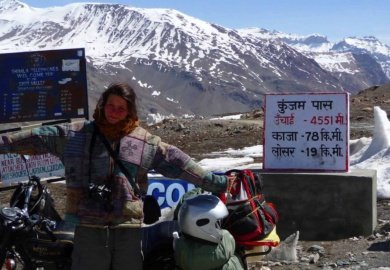Drift through eroded badlands where wind sculpts time.
I first saw Lamayuru the way sailors once sighted coastlines through a moving frame, mistaking distance for safety. The road west from Leh unwinds in patient loops, and after the long rise of the passes and the steady company of the Indus, the land begins to drop its disguises. Hills soften to ash. Ridges turn to cinder. The world seems to have been erased to its primer. Then, without ceremony, the valley opens and the ground falls away into a geography of whispers: gullies and spires, honeycombed slopes, pale amphitheaters of dust and light. The driver tapped his horn twice at nothing in particular habit, greeting, prayer and pointed his chin: “Moonland.”
It is an exhausted nickname and still correct. Lamayuru’s badlands, scraped out of lakebed sediments and ancient sea silt, do look lunar pale and pitted, a landscape rehearsing how to be a memory. But the moon does not smell like this like sun-warmed clay and cold shadow, like dust that remembers river, like the breath of juniper smoke sneaking up from a kitchen. The moon does not have chortens on a ridge line or a monastery whose walls tell stories in a language that doesn’t need translation. And the moon does not have wind with this particular temper: curious, precise, patient enough to edit a mountain into a rumor.
We stopped at a turn where the valley revealed itself like a hypothesis. Below us, the badlands collapsed in pleats: butter-yellow folds, scalloped edges, soft pinnacles, the erosional equivalent of lace. The monastery Lamayuru Gompa sat on its crag like an idea that had learned to wear stone. A raven crossed the view with the arrogance of a local elder. The driver, who had stopped here a thousand times, let me have my silence. Wind lifted the fraying ends of the prayer flags and used them to write a sentence I could almost read.
I checked into a homestay whose kitchen understood travelers better than maps do. The host, a woman with a braid that told me more about discipline than I wanted to hear, pressed a cup into my hands and told me where the path began. “Go when the light softens,” she said. “The ground shows you its face then.” Her little boy, who had yet to be impressed by any landscape, showed me how to fold a biscuit wrapper into a boat. We launched it in a washbasin and watched it circle until it met its particular physics and folded back to earth. A good rehearsal for the day, I thought: everything returns to silt.
By late afternoon, the sun had declined into the right kind of honesty. I stepped out with a small pack water, apricot kernels, a notebook, and an ambition to belong. The village smells clung to the shade: warm straw, dung cakes drying into next winter’s arguments, diesel aging into consent. A donkey rehearsed a complaint nobody would answer. The path began as village paths always do unsure, braided to test whether you’ve earned your bearings. It separated, then reunited, like a family that knows where it’s going.
From the first bend the ground announced its story. This was not hard rock carved by temper and rivers. This was something softer: layers of fine sediment, mudstone and siltstone, pale as unbaked bread. The hills were not built by violent tectonics alone; they had also been composed by patience: a lake long gone, a basin where an ancient sea once flirted with sun and lost. The wind had taken over the final edit. It had fingers. It knew the difference between persuasion and force. It had decided that this valley should be taught to remember water by becoming the thing water leaves behind.
I walked into it the way you walk into a quiet room that has seen arguments. Every step released a fine cough of dust, and now and then my boot rolled on rounded pebbles that had no right to be this high or this dry. I touched them and felt their old polish the sheen of travel that only rivers give. I put one in my pocket and then took it out, because stealing is theft even when the victim is time.
At the first eroded amphitheater, I stopped. The basin spread below me like a shallow bowl someone had pressed a thumb into many times. Each press had become a gully; each gully, a channel. The edges were undercut, scalloped like the hem of a ceremonial robe. I sat on a ledge and watched the shadow line creep along a slope, discovering, as photographers and farmers know, that shadow is information. Here, it revealed the vertical stitching in the hills the fine, repeating lines that were once horizontal layers thickening across the bed of water. You could read them the way monks read scriptures finger following line to keep mind from wandering. I didn’t pretend to understand their grammar. It was enough to know that the valley had been a library and the wind a slow, relentless reader.
A group of schoolchildren clattered past, cutting diagonally down to the stream that had sunk itself out of sight. They seemed untroubled by gravity and immune to awe. One girl yelled “Hello!” with that bright international courage children carry. I answered in the only Ladakhi I trust julley and they laughed because I did it right and because even if I hadn’t, the wind would have corrected me. They vanished into the broken light like good sentences do.
The first spires appeared as the path narrowed: freestanding columns, some thin as wrists, some fat as pillars, all capped by a harder stone that hadn’t surrendered yet. Hoodoos, a geologist would call them. I don’t know what the villagers call them probably something less ornamental and more instructive, like don’t climb that. They looked delicate, but delicacy is not the right word. They were stubborn in a register city hearts don’t practice. I resisted the urge to put my palm on one it felt like the kind of touch that the hill would remember in the wrong way and instead stood close enough to hear what wind does when it plays a soft instrument. It hummed at the openings and found notes in small holes, a flute made of accident.
The ground demanded a different stride. On flat earth you walk to arrive; here you walk to negotiate. My breath found the old Ladakh rhythm counting steps, then a pause, aligning heart and hill like two people who need to share a bench. The light loosened further. The badlands took on an inner glow, as if lit from beneath by a library lamp. The monastery’s chants lifted somewhere above and scattered into vowel before they reached us, a rumor of devotion. I was alone without being lonely, which is the correct way to walk in a place that knows things about silence.
At a small saddle, where the path briefly remembered ambition, I met a monk seated on a stone with more elegance than chairs allow. His maroon sleeves held in the wind; his eyes did not. He looked like a man listening to a long story for the third time because the ending keeps changing. He nodded me into his afternoon and made space on the stone without moving.
“From Leh?” he asked. All hospitality here arrives as a question and an assumption. He spoke in the register of people who spend their days in rooms where sound is a choice.
“From farther,” I said. “And from nowhere sensible.” He laughed once like a bell the wind had permission to ring.
“Old sea,” he said, pointing with his chin the way every teacher in this valley points at truth. “First, water. Then wind. Now we sit.”
“I came to walk,” I said, and immediately felt the smallness of the sentence.
“Walk,” he agreed. “But also sit. Wind explains more when you are not moving.” He closed his eyes and was not asleep. I tried to follow his example and found that my attention still needed work. The valley spoke in paragraphs and I kept interrupting.
So I moved, as students do when they don’t absorb lectures: slowly, stubbornly, toward a lesson I could understand at ankle height. The path zigzagged down into a narrow corridor where the walls rose close enough to touch both. I did, at one point, and the wall answered with a skim of powder that spread across my palm like ash. You don’t notice how greedy your hand is until the ground punishes it with proof. I wiped my palm on my pant leg and watched a small puff of history blow away.
A shepherd appeared at the top of the gully with the specific grace of people who spend their lives insisting on compromises between animals and terrain. His sheep were scattered like punctuation across the slope commas, ellipses, the occasional stubborn period. He whistled a note that told a longer story than my notebook could hold, and the flock found a line again. “Careful,” he called down to me, pointing at nothing in particular and everything in general. “The ground is polite until it isn’t.” He clicked his tongue, and the sentence resumed its movement.
The gully closed and then opened into a basin where a trickle of water had the authority of a river simply by being the only water. Little green congregations willow, seabuckthorn, a stubborn grass clustered around it like language around breath. I knelt, cupping my hand to drink, and the cold rehearsed winter on my teeth. The water carried earth in solution the oldest conversation. I looked upstream; the trickle had gnawed a path, carving miniature canyons at a scale that would make a drone proud. I did not have a drone. I had knees and gratitude and the consideration to put my empty hand on the damp bank where it could come away with mud but not with anything irreplaceable.
Wind crossed the basin with new motives. Down here it was a courier, ferrying coolness from shadow to sun and back again. It read the ground like braille and then translated for my skin. I sat, because the monk had been right. The soundscape separated itself into layers you could count without numbers: a higher hiss at the hill crest where air found the lip; a middle murmur where it worried at shrubs; a lower, almost inaudible rub where dust moved enough to make time visible. I finally took out my notebook. I didn’t write metaphors those arrive whether invited or not. I wrote verbs: scallops, fray, pleat, powder, sift, undercut, polish, hush.
The sun began its slow tilt toward authority. Shadow deepened in the gullies; the pale hills flushed to a muted gold. I climbed the opposite side slow, controlled, my heel setting into soft earth like a stamp you don’t want to leave. At the ridge, the world opened again: the monastery now to my left, the highway a fine line to my right, and ahead, the farther ranks of the Zanskar, blue and folded, a complicated horizon. This is where the phrase “ancient sea” returned not as poetry but as fact. The hill to my feet contained, visible in cross-section, thin beds of silt like the pages of a closed book. A harder band perhaps a thin limestone jutted as a lip. Here and there, the imprint of something that might once have been living shell? ripple? just enough to invite humility, not enough to invite certainty. I put my face close and smelled what my school had never taught me: rock warmed by a sun at altitude has a scent; it is the smell of arithmetic done on the skin.
The wind picked up. It pressed my jacket to my ribs, then forgot me and went to work. A stream of dust lifted off a ridge twenty meters away and walked across the slope as a transparent animal. The prayer flags up at the gompa unfurled into their duty. A raven returned, lowered itself onto a dead juniper, and let its shoulders be part of the valley’s equation. I raised my hand and the wind tried my fingers on as if shopping for gloves. For a brief minute I felt what children feel when they learn that air has weight not quite resistance, more like intent.
I followed the ridge until the path dropped toward the village. From above, the little square fields looked like memory aids barley, buckwheat, peas green stitched onto pale. A woman bent at a line of cabbages straightened and put a hand to her lower back in a movement older than agriculture. Two boys played cricket with a ball that had once been red but now was philosophy. The monastery bell called a service no one can schedule in a phone. The wind, having done its shift, began to soften into evening.
I returned to the homestay with the posture of the properly used. My host, who had known exactly how the day would treat me, handed me a bowl of thukpa and a cup of tea. Butter tonight; sweetness tomorrow; the valley likes to alternate. The little boy asked whether the moon had been at the moonland. He did not wait for my answer; children don’t require your metaphors. I ate the noodles like prayer slow, grateful and went out again because night in Lamayuru is not to be ignored.
The moon found the badlands and made them honest. All day they had seemed soft; under moon, they sharpened. Edges declared themselves; shadows laid down strict versions of events. The monastery glowed as if it had learned how to host the moonlight without being shocked. A dog, who had chosen me as a temporary congregation, walked me to the lookout and accepted a biscuit as his tithe. The wind had traded its tools. All day it had sculpted; at night it conducted. Stars arrived not as decoration but as argument. The longer I stood, the more it felt possible to believe in quiet without having to become small.
It is one thing to walk a place and another to be walked by it. Lamayuru did both to me. It made a path across my attention I can still follow: ridge, gully, basin, ridge, village. But the truer track was in the ability to imagine water where there was none, to accept wind as an author, to grant dust the dignity of memory. I slept under a heavy quilt with my hand still dusty despite all attempts at washing it clean; the hills, I suspect, were pleased by the residue.
The next morning I went higher not far, just enough to look down at my own footsteps. Morning light reveals different crimes: the path I had “found” now looked as if it had found me. The spires were paler, apologizing for last night’s theatrics. The monastery sent up a thin smoke of breakfast and devotion. I took the old highway shoulder toward Fotu La for an hour to see the valley stretched longer. From there the badlands braided into one another like a congregation whispering the same prayer in different accents. The wind was indecisive early on, then remembered who it was and resumed work. In the distance a truck moved like punctuation, unhurried, correct.
On the way back I met the monk again, this time walking, sandals sure on bad ground. “You sat?” he asked, the only metric he cared for.
“I sat,” I said. “And I listened.”
“What did it say?” He didn’t smile. The question had standards.
“That water is patient and wind is thorough,” I said, surprising myself with how quickly the sentence arrived.
He nodded like a teacher whose student had finally turned in homework without apology. “And?” he pressed.
“That everything we build wants, eventually, to become weather.”
He laughed then, the sound cutting a new channel through my certainty. “Then build well,” he said. “So it becomes good weather.”
I carried that with me into the settlement and into the day. I visited the gompa’s assembly hall, where butter lamps braided light into discipline, where the murals carried blues that only happen in dry places, where a child monk tried to be serious and failed so beautifully that even the wind held its breath. I stood at the balcony that looks down into the badlands and the village and the road and the far blue. The balcony is a thesis: humans making a place that can look at what cannot be owned. I put a small note into the donation box not as payment but as receipt. I lit one lamp because light needs witnesses.
Later, in the warm of the kitchen, my host put a bowl of barley flour in front of me and taught me how to eat tsampa properly tea poured into a hollow, fold, fold, fold, roll, roll, roll until it held together and then, briefly, held me together. “You walk better if you eat like this,” she said, approving my technique only in the merciful way a mother approves a child’s courage. “Wind takes less then.”
We told each other the day’s small stories. She described how the river had changed its mind three seasons ago and how the village had changed its mind faster. I told her about a hoodoo that had looked like a petrified dancer. She nodded: the hills often danced before they were asked to be hills. When I mentioned the monk and the wind, she waved a hand with authority: “Wind is a monk with a broom.” I wrote that down and then drew a broom next to it so I would not be tempted to improve the sentence later.
In the late afternoon I went one last time into the badlands, this time with no ambition but a walk. I let the valley select the route left at a shrub, right at a shadow, straight when the ground pretended to be kind. A lizard, invisible until it moved, skittered into a crack that reached back to a century. A beetle pushed something larger than itself up a slope with the patience of a doctrine. A hawk investigated my head and decided against it. I stood at a corner where the ground had slumped an old landslide, healed at the edges and imagined the day it had slipped, the sound it made, the quiet that followed, the way villagers read that quiet like weather. It is not an accident that Ladakhi has so many words for wind and time; here, the two are colleagues.
At the far edge I sat, again, without embarrassment, because by now sitting felt like a legitimate form of walking. I took out the pebble I hadn’t stolen and put it back on the ground where it could gossip with its sediment. I thought of all the places I had tried to own with photographs and lines and how many of them had owned me instead. Lamayuru had turned the equation by refusing to be played at my speed. If you rush, it powders. If you wait, it explains.
I wrote a list because the valley recommended lists:
- What wind does: carves, softens, harvests corners, introduces sky into ground, teaches patience by removing shortcuts.
- What water did: laid out pages, taught horizontals, practiced balance, made decisions that the hills are still obeying.
- What time is here: visible, audible, granular, a language read with fingertips.
- What I am: a walker, a sitter, a student, a mouth that learns new tastes.
- What to remember: build well so you become good weather.
I stayed until the first true cool entered the slope and my shadow met me like an appointment kept. Back in the village, a girl ran past with a prayer wheel that looked too heavy for her but wasn’t, because repetition makes strength. A man cycled uphill with groceries and dignity. A motorbike stuttered into evening and quieted. The monastery bell saw the day out like a doorman with excellent manners.
That night the wind was a gentle clerk, filing constellations where they belonged. The badlands slept in their strict outlines. I slept like dust when it finds a jar. In the early hours a dog announced a theory to the darkness, was answered, and then moved on to other work. When dawn came, it brought with it a clarity that made everything feel like a first draft done well. I knew I had to leave. Wanderscapes are not homesteads. You are granted a few days to learn your portion and then the valley has other students.
We drove out after breakfast. The driver, who had the courtesy to let silence finish its sentences, glanced at the mirror to check I had said my goodbyes. I looked back until looking back became seeing forward: the gompa shrinking to a comma, the badlands smoothing into a single page, the village stitching itself into a seam between two arguments rock and sky. We climbed toward Fotu La and the valley folded away with the neatness of a chart put back into its sleeve.
“What did you do there?” the driver asked finally, not as small talk but as an assessment.
“Walked,” I said. “Sat. Listened.”
He smiled and did not look away from the road. “Good,” he said. “Moonland is for ears.”
We crested the pass and the world rearranged itself again new valley, new wind, new problem for the road to solve. In my pocket the pebble I had not stolen was not there; in my notebook the sentences I had taken were not enough. But under my ribs something had been rearranged. I could feel the soft scaffold of patience where ambition had been holding up the day. I could feel the wind’s grammar tugging at my vocabulary. And somewhere under all that, the old sea turned in its sleep and forgave my feet for borrowing the shore.
Days later, in a different town where the wind had other employers, I washed my hands and watched the water turn slight beige. The hill had held on. I smiled into the basin and let the last of Lamayuru run down the drain only because I knew it hadn’t really left. It had become something else: a way of looking at time without panic; a rhythm for the breath on difficult ground; a tolerance for silence that wasn’t empty but full of editorial notes. When I closed my eyes that night, the badlands rose behind them not theatrical, not lunar, just present, insisting on the dignity of being unfinished.
I will go back, of course. You don’t walk an ancient sea once and think you have met it. Next time I will carry less and sit more. I will try to remember that wind is a monk with a broom. I will touch nothing that won’t thank me for it. I will try to build my days the way that monk advised: well enough to become good weather. And when the valley asks, as it always does, what I’ve brought, I will say: ears.





